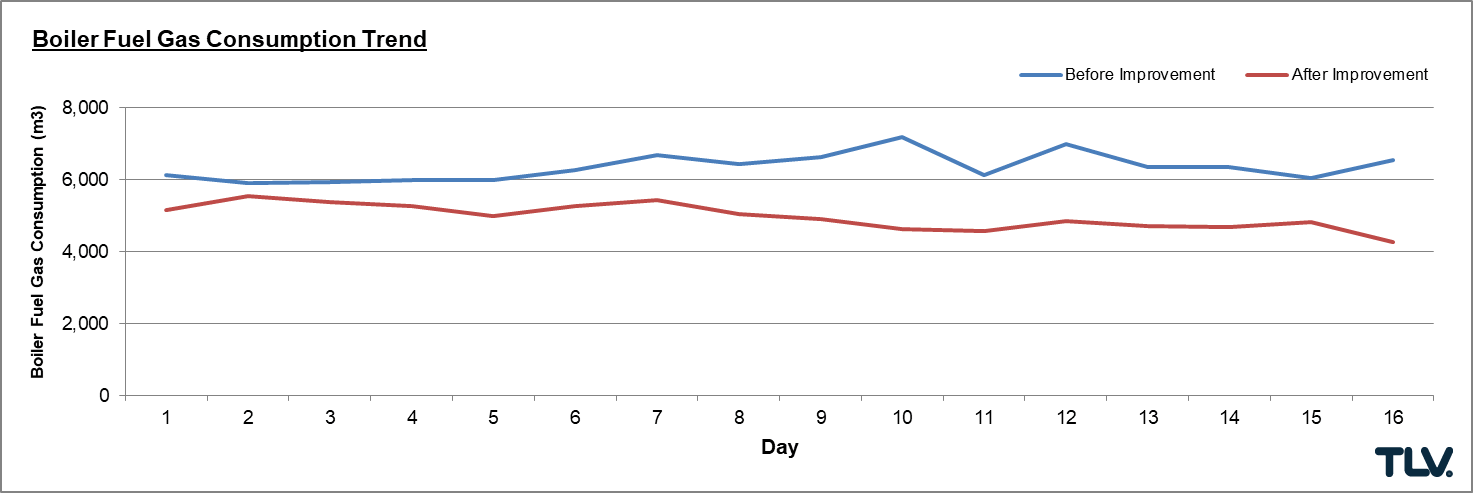- Home
- Success Stories
- TLV Helps Synthetic Leather Manufacturer Achieve Energy Savings
TLV Helps Synthetic Leather Manufacturer Achieve Energy Savings
TLV SHANGHAI CO., LTD. (China)
Kyowa-GSK Plastics (Langfang) Co., Ltd manufactures and supplies synthetic leather to top automotive manufacturers in China. Steam is the key energy source in their manufacturing plant, and amid rising energy costs, it has become crucial to properly manage steam and reduce steam wastage. With this in mind, TLV engineers carried out a plant walkthrough for Kyowa-GSK to identify energy saving opportunities.
Site Findings
1. Significant steam loss due to leakage from steam traps and bypass valves
From the survey conducted by TLV using TrapMan® TM5N, it was found that as much as 66.7% of the population of conventional lever float traps used in Kyowa-GSK had failed, costing an estimated yearly loss of RMB 233,000. Additionally, bypass valves of several condensate discharge locations were kept open due to steam trap blockage, leading to unnecessary steam waste and further economic losses.
2. Poor steam distribution and condensate discharge piping design
Site findings showed that there were no condensate discharge locations installed along steam distribution lines. Also, with the steam supply to the steam-using equipment tapped from the bottom of steam distribution line, condensate and dirt readily entered into the equipment, leading to increased steam consumption and higher maintenance costs. Vertical lift at the steam trap’s outlet hindered condensate discharge, thus contributing to condensate accumulation in the steam-using equipment.
3. No condensate recovery
The hot condensate was cooled using cold air and then discharged to the atmosphere, wasting the heat energy contained in the condensate.
TLV Proposals
The following TLV proposals were implemented:
1. Replacement of Steam Traps and Bypass Valves
All lever float steam traps in the plant were replaced with TLV Free Float® steam traps. The bypass valves were also replaced and properly shut to eliminate steam loss.
2. Improvement of steam distribution and condensate discharge piping
Condensate discharge points were installed at appropriate locations to prevent condensate backup and ensure the supply of high quality steam to equipment.
3. Condensate return to boiler installed
The condensate piping was modified to return hot condensate back to the boiler, thus re-using the heat energy contained in the condensate.
Feedback from Customer
According to Kyowa-GSK, the average monthly savings achieved after refitting their plant with TLV steam traps was approximately RMB 100,072, and another RMB 30,000 of monthly savings were achieved via the new condensate recovery design. The graph below (provided by Kyowa-GSK) compares the boiler fuel gas consumption over 16 days before and after the improvements. Boiler fuel gas consumption has declined, indicating cost savings from lower fuel consumption.
TLV engineers regularly visited Kyowa-GSK to provide technical consultation and steam trap inspection. Overall, through the implementation of TLV’s steam trap management program, Kyowa-GSK has reaped significant benefits, including energy savings, reduced CO2 emission, and even lower production costs with enhanced energy efficiency.
